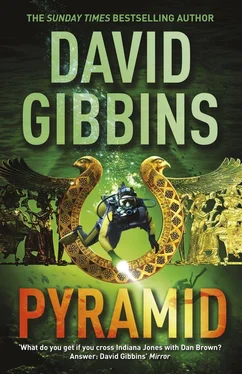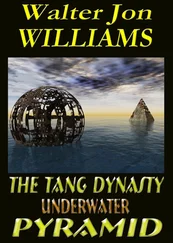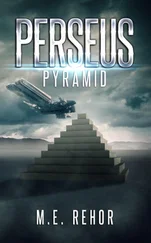“Your cousin Ahmed, the ex — special forces man and his team?”
Aysha nodded. “It’s out of our hands now, Jack. If they can spring her, they’ll do it. If not, they’ll die trying.”
“What about Lanowski?” Costas said, jerking his head to the shuffling mystic following them a discreet distance behind.
“He volunteered to be your point of contact at the synagogue after I’d heard about the impending crackdown and knew I was going to be delayed getting those documents. I could only get two CNN passes. But he’s the least of my worries; he blends in just fine.”
“You won’t believe what we found,” Costas said.
“Don’t tell me. I don’t what to hear anything, just in case I’m interrogated.”
They came to the end of the alley and peered into another, much larger square with a columned structure in the center. The square seemed a maelstrom of activity, with eruptions of fire, the sound of falling masonry and bursts of automatic gunfire, and lines of black-clad men with Kalashnikovs encircling the perimeter.
“That’s the mosque of Amr ibn al-As,” Aysha said. “It’s the oldest mosque in Cairo, founded in AD 642. The extremists have taken it over as their spiritual focus. The original mosque where Abn al-As pitched his tent was made of palm trunks and leaves, and they’re planning to re-create that. The present mosque is made of reused columns and blocks from ancient Egyptian sites that they regard as non-Islamic. And beyond that they’ve created an execution ground. The gunmen have already begun dragging people there from the government buildings, the Ministry of Culture first. They seem to have the greatest contempt for the Antiquities Service.”
“It’s a cold calculation,” Jack said. “They’ve used the moderate regime as a stepping-stone over the last months, sweet-talking men like our beloved antiquities director and promising him big rewards, but now that the coup has happened it’s a different story. They want moderates to see that only a strict regime is possible and that any who fail to follow them will pay the price.”
Aysha peered out at the square. “You’re going to see some terrible sights, but you must keep your cool. Do not, I repeat, do not try to intervene.”
“You mean we’re going through that ?” Costas said, sounding horrified.
“You’re reporters, right? Reporters don’t slink around in back alleys. They go to where the action is. You’re going to walk right past that crowd and then on toward Salah Salem Street beyond. I’ll make my own way and rendezvous with you there.”
“Won’t you be safer sticking with us?” Costas said.
She shook her head, replacing her head veil so that her face was concealed except the slit for her eyes. “From now on any Egyptian seen helping reporters is going to be targeted, especially a woman. They’ll assume I’m using you as a means of escape.”
An ear-piercing shriek rent the air behind them, followed by the sound of wailing. There was another shriek, cut short by a burst of gunfire. Jack remembered the face of the young woman he had seen sprawled on the ground. That girl had a father and a mother somewhere; she could have been Rebecca, anyone. Aysha saw him staring, and touched his arm. “I call on all Muslims in Egypt and all other faiths to defeat this evil and bring an end to it,” she said. “In Egypt the people will prevail.”
“Amen to that,” Costas said.
A call to prayer suddenly filled the air, crackling out from loudspeakers mounted on a pickup truck that was slowly circling the square.
“Okay,” Aysha whispered. “Walk out now. Don’t even look at me as I leave.”
She was gone, and without thinking Jack did as she instructed, Costas following close behind. Lanowski was nowhere to be seen, but Jack could not afford to track him now. Everyone in the square was kneeling toward the east and praying, following the instructions of the recording from the vehicle. Two of the gunmen saw them and jumped upright, but backed off when Jack walked brazenly forward and thrust the press ID at them. About fifty yards farther on they passed the place where the façade of the mosque was being hacked down and the boys had been picking up rubble to take to the stoning ground. Abruptly the prayer ended and the vehicle sped off, and everyone jumped to their feet. Jack kept pressing on, veering sideways to avoid a crowd of people and the gaze of more gunmen whose eyes were following them.
He reached the northwest corner of the perimeter wall around the mosque, about halfway to the street exit that Aysha had indicated. He took a deep breath as he and Costas rounded the corner into an open space about fifty yards across surrounded on three sides by dense throngs of men and on the other by the perimeter wall of the mosque. By skirting the wall they had walked straight into the gaze of the onlookers, but they were not the main focus of attention. In the center he caught sight of a line of kneeling men, and then saw the flash of a sword. He forced himself to look forward, to focus on getting through. He remembered the image of the burning pyramid; he had thought that was as bad as it could get, but now he realized that it was merely a grim portent. Already another line of men were being led out, kicked and rifle-butted by the gunmen as the swordsman walked back to his starting point, his blade dripping with blood.
Jack reached the onlookers and forced an opening, with Costas following close behind. From his height he could see above the throng to where a further group was being escorted from a street into the square, providing the executioner with a continuous line of victims, the women among them forcibly separated and led in a separate group toward the stoning ground. Many of the men were well dressed but already dishevelled and bloody, some of them pleading and praying as soon as they began to realize what was about to happen to them.
Jack suddenly remembered what Aysha had said: the Ministry of Culture. That was who these people were . Then his heart lurched. The Ministry of Culture included the Antiquities Department. He pressed through the throng, staring at them. He was sure that he recognized some of the faces, inspectors and dirt archaeologists who had been the mainstay of Egyptian archaeology for years, friends and colleagues who had worked alongside Hiebermeyer at the mummy necropolis, at their excavation of the Roman port on the Red Sea, at the crocodile temple site beside the Nile in Sudan. Jack was suddenly conscious of his own visibility, hoping that none of them would see him. He felt as if he were betraying them, but there was nothing he could do. To be recognized now for who he was would be the death knell for him and for Costas. He forced himself to think of what they were doing, taking away a last hope for Egyptology and the achievements of those people, something that might just give the world a legacy of Egypt other than the images of medieval horror they were witnessing now.
They were nearly through the area, but the swaying momentum of the crowd was forcing them close to the line of prisoners. Jack pressed against the crowd to push away from them, but to no avail. There was another eruption of yelling and chants from behind them, and the line of prisoners shuffled forward. He held his Press ID forward and tried to keep his head down, focusing his mind solely on the open street ahead, moving toward the line of gunmen who formed a cordon around the outer perimeter of the crowd.
For a fleeting moment he made eye contact with one of the prisoners. It was an overweight man, balding, dishevelled, his hands tied behind his back, with gunmen holding him on either side. Jack’s mind froze. He had met the man only once, an imperious audience of a few minutes in the ministry after he and Hiebermeyer had been made to wait for hours. It was the antiquities director . Jack pushed past, holding his breath. There were only a few yards to go before they were out of the throng and on the street. There was still a chance he had not been recognized. He pressed on, pulling Costas close behind him.
Читать дальше












